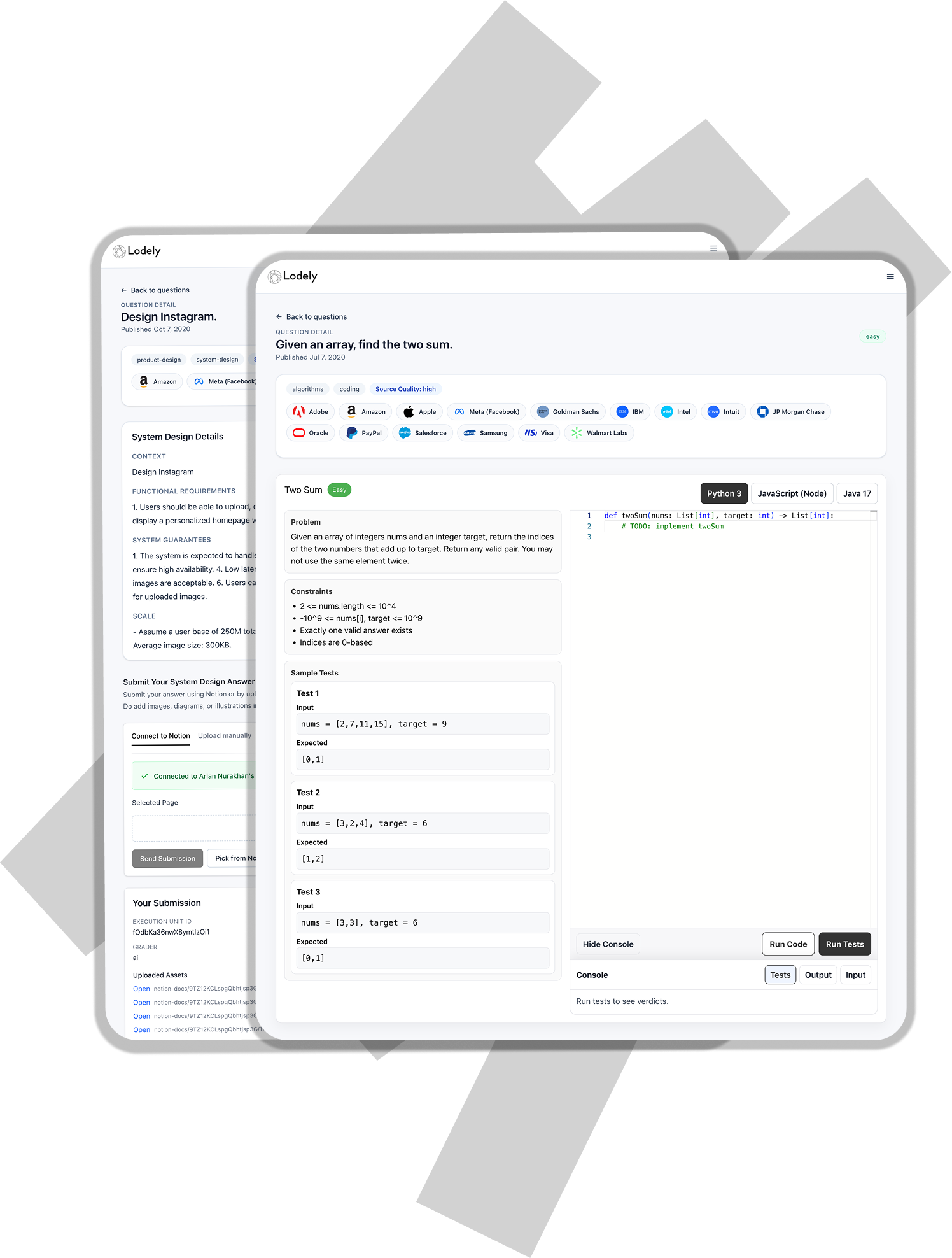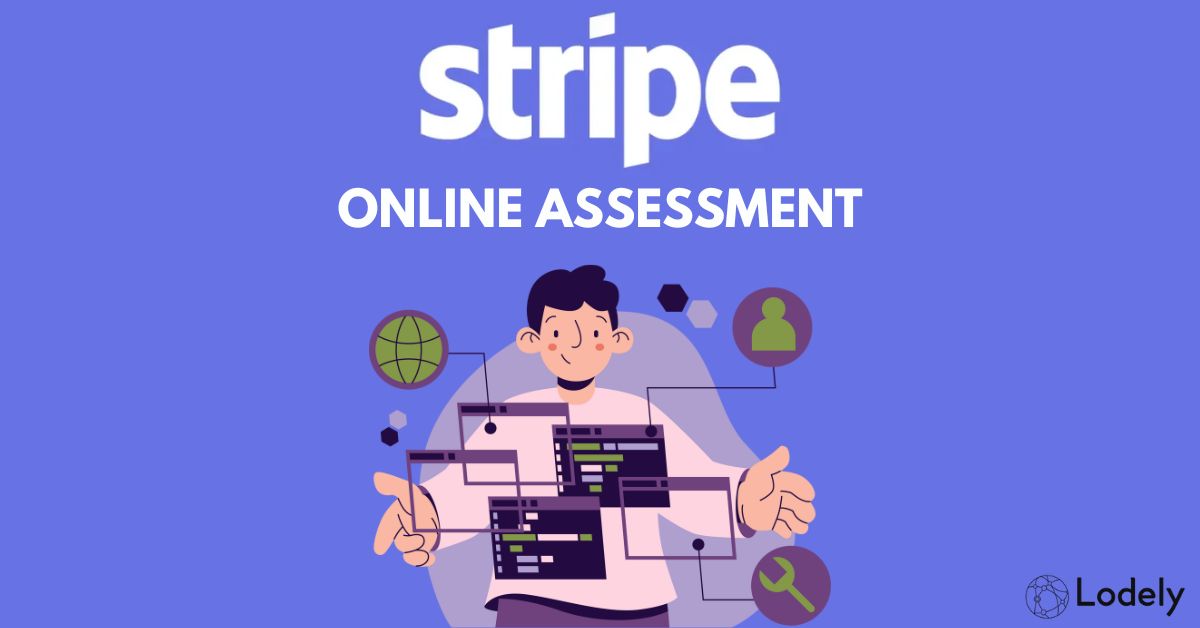Which Companies Pay the Most for Software Engineers
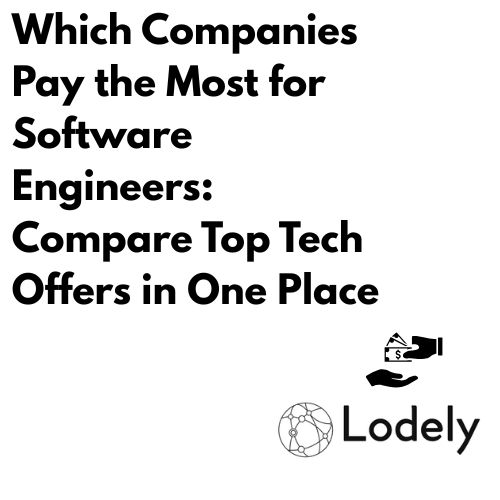
Which Companies Pay the Most for Software Engineers: Compare Top Tech Offers in One Place
Software engineers doing the same job are getting paid anywhere from $120K to over $3 million. One company even pays more than double what its competitors do for the same title. So what’s driving the gap? And more importantly, where should you aim if compensation is the goal?
Let’s break down which companies pay the most for software engineers and what separates them from the rest.
Big Tech's Salary Arms Race: Who's Winning the Fight for Engineering Talent
The compensation spread in our industry is absolutely wild. We're talking about ranges from low six figures all the way to multi-million dollar packages for the same "Software Engineer" title.
Here are the exact numbers from the companies that pay the most, backed by real data from Levels.fyi.
The Elite Tier: Companies Paying $ 400K+ Median
When people talk about "making it" in tech, these are the companies they're referring to:
Netflix leads the pack at $460K median total compensation. Their compensation philosophy is simple: pay the top 1% of the market to get the top 1% of talent. The range? $223K to $1.12M. Yes, you read that right.
Meta (Facebook) and Stripe tie at $401K median. Meta's range spans $197K to $3.67M, with their E9 engineers pulling down packages that most people can't even comprehend. Stripe, the payments giant, offers $192K to $933K.
The Proven Players: $270K+ Median Territory
Uber sits at $331K median with a range of $191K to $1.56M. Not bad for a company that started as a taxi app, right?
Apple hits $324K median ($162K to $783K range). The iPhone maker knows how to retain talent.
Google comes in at $304K median ($198K to $2.36M range). Their L9 engineers? They're looking at $2.36M packages. That's not a typo.
ByteDance (TikTok's parent) offers $290K median ($207K to $838K range). The Chinese tech giant is paying competitive Silicon Valley rates.
Amazon sits at $272K median with a $178K to $1.66M range. Here's what's interesting about Amazon - they hire massive volumes of engineers, so your chances of getting in are actually pretty good compared to some of these other companies.
Microsoft rounds out the big tech players at $218K median ($162K to $1.08M range). Not the flashiest, but incredibly stable and still paying well above market.
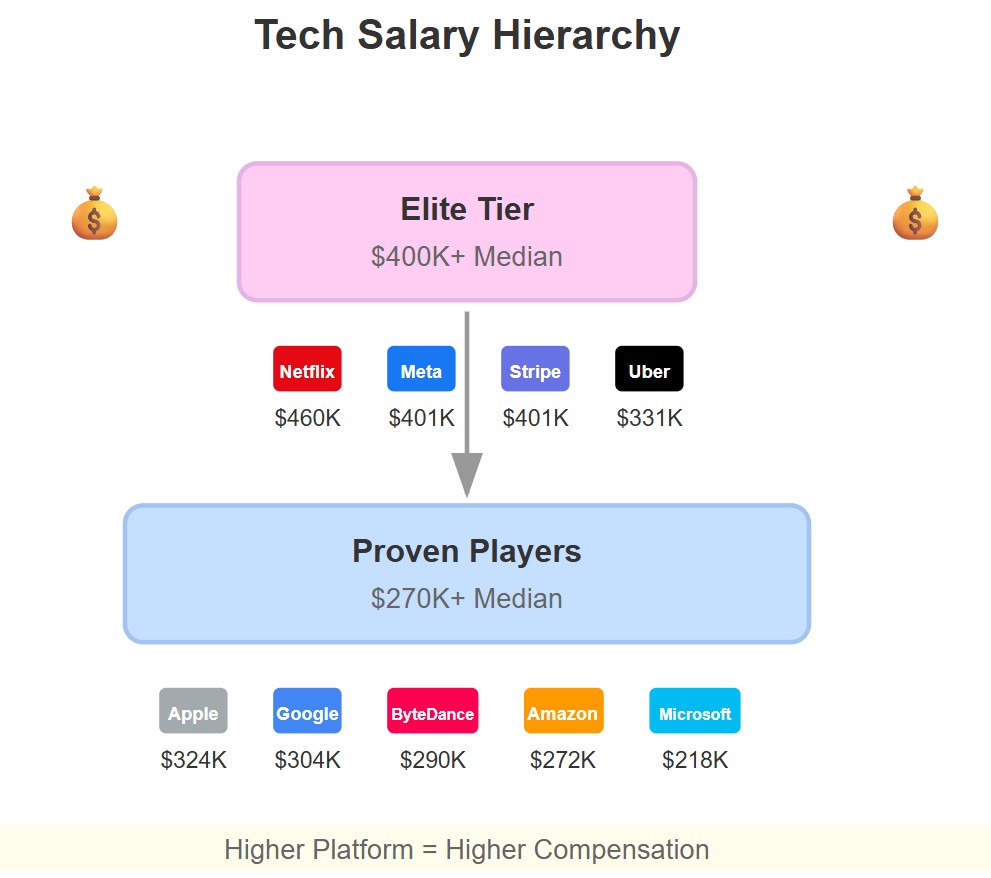
Real Talk: How Experience Changes Everything
Here's where it gets interesting. Let me break down Amazon's levels because they're pretty representative of how compensation scales:
Entry-Level (Amazon SDE I): $177,997 median
Mid-Level (Amazon SDE II): $283,821 median
Senior (Amazon SDE III): $390,907 median
Notice the pattern? Each level roughly doubles your compensation potential. This is why leveling up is so critical in your career.
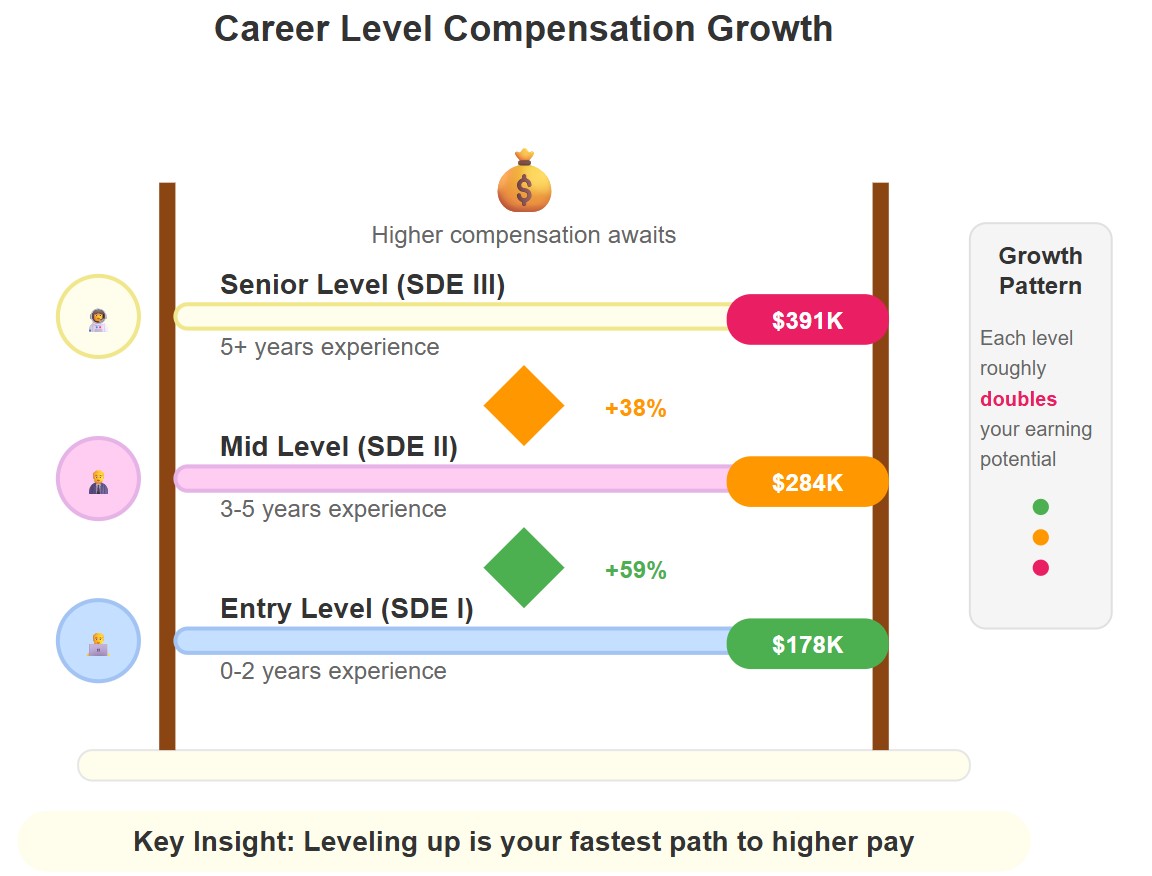
If you're making $120k at a mid-size company in Austin, jumping to one of these companies could instantly double or triple your compensation. I've seen it happen countless times.
Your Roadmap to Landing Those $400K+ Engineering Jobs
Alright, so you've seen the numbers. You know, Netflix engineers are pulling in $460K, and Meta folks are hitting $401K median. The question burning in your mind is probably: "How do I actually get there?"
I've been in this industry long enough to see countless engineers make this jump. Some nail it, others struggle for years. The difference? They know exactly which skills to build, how to interview, and what experience actually matters.
Let me break down the real playbook for you.
Skills That Actually Move the Needle (And Your Salary)
Here's the thing about skills - not all technical expertise is created equal. You can be a React wizard, but if you're not working in the right domains, you're leaving serious money on the table.
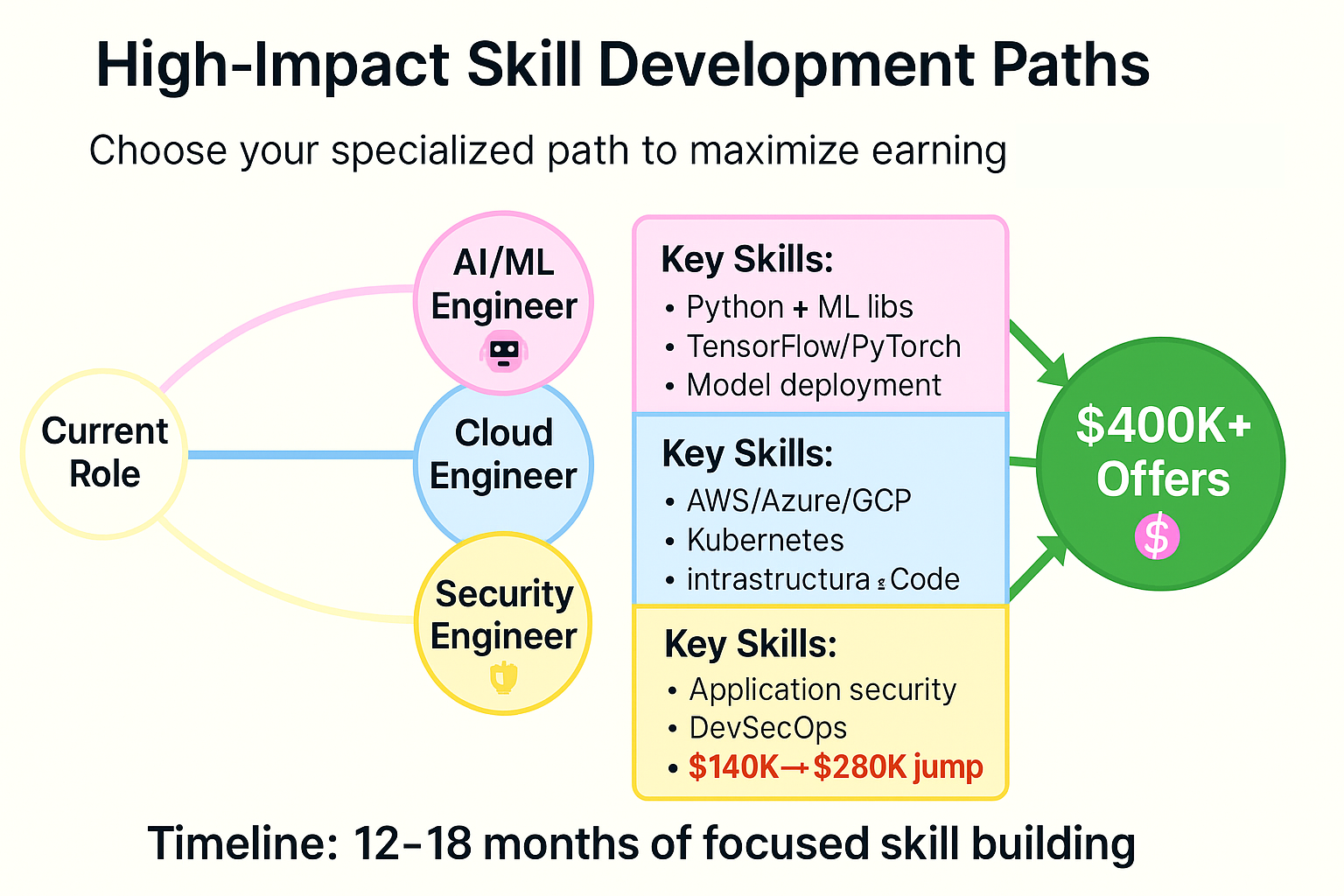
AI/ML: The Golden Ticket
If you want to maximize your earning potential, this is where the action is. I'm talking about engineers who've transitioned into ML roles and seen their compensation jump 40-50% almost immediately.
What you need to know:
- Python mastery (not just basics - you need to be comfortable with pandas, numpy, scikit-learn)
- Deep learning frameworks like TensorFlow or PyTorch
- Statistics and math fundamentals (yeah, I know, but you can't fake this in interviews)
- Model deployment - because building models is one thing, getting them into production is where the real value is
Pro tip: Start with a side project. Build something real, deploy it, and put it on your resume. I've seen engineers land $300K+ offers just by demonstrating they can ship ML products, not just fiddle with Jupyter notebooks.
Cloud Architecture: The Infrastructure Goldmine
Cloud engineers are in crazy high demand right now. Every company is either migrating to the cloud or optimizing their existing setup.
Focus on these:
- AWS/Azure/GCP certifications (yes, they actually matter for cloud roles)
- Infrastructure as Code (Terraform, CloudFormation)
- Container orchestration (Kubernetes is basically mandatory now)
- Serverless architectures (Lambda, Azure Functions)
The beauty of cloud skills? You can learn them while doing your regular job. Start by containerizing your current projects, then move to cloud deployment. Before you know it, you'll have real experience to talk about in interviews.
Security: The Overlooked Cash Cow
Here's what's wild - security engineers are some of the highest paid in the industry, but most people ignore this path because it seems "niche." Big mistake.
Key areas to focus on:
- Application security (knowing how to secure APIs, understanding OWASP top 10)
- DevSecOps (integrating security into CI/CD pipelines)
- Cloud security (IAM, network security, compliance)
- Incident response (because when things go wrong, companies pay big money to fix them)
I know engineers who've jumped from $140K to $280K just by specializing in security. The demand is insane, and the supply is limited.
Cracking the Interview Game at High-Paying Companies
Let's be real - the interview process at these companies is brutal. But it's also predictable. Once you know the game, you can prepare strategically.
Coding Challenges: Your Foundation
Every single one of these companies will test your coding skills. There's no way around it.
Here's my approach:
- LeetCode is your friend - aim for 2-3 problems daily, focus on medium difficulty
- Master the patterns - sliding window, two pointers, dynamic programming, etc.
- Time yourself - you need to solve problems quickly and cleanly
- Practice explaining your thought process - they care about how you think, not just the solution
Insider tip: Most people over-prepare on hard problems. Focus on crushing the mediums consistently. That's where 80% of interview questions come from.
System Design: Where Senior Engineers Shine
If you're going for senior roles (which is where the real money is), system design interviews are make-or-break.
What they're really testing:
- Can you think at scale? (millions of users, not hundreds)
- Do you understand trade-offs? (consistency vs availability, latency vs throughput)
- Can you communicate complex ideas clearly?
My preparation strategy:
- Read "Designing Data-Intensive Applications" - seriously, this book is gold
- Study real system architectures (how does Twitter handle feeds? How does Netflix stream videos?)
- Practice drawing diagrams - you need to be comfortable whiteboarding your ideas
Behavioral Interviews: The Underestimated Multiplier
Here's what most engineers get wrong - they think technical skills are enough. Big tech companies care just as much about how you work with others.
They're looking for:
- Impact stories - times when your code made a real business difference
- Leadership examples - even if you're not a manager, they want to see initiative
- Problem-solving under pressure - how you handle when things go sideways
Use the STAR method religiously: Situation, Task, Action, Result. And quantify everything. "Improved performance" is weak. "Reduced page load time by 40%, resulting in a 15% increase in user engagement" is gold.
Building Experience That Actually Matters
This is where most engineers go wrong. They focus on getting any experience instead of the right experience.
Target the Right Projects
High-impact projects that interviewers care about:
- Performance optimization (anything involving scale, speed, efficiency)
- Cross-functional initiatives (working with product, design, data teams)
- Infrastructure improvements (CI/CD, monitoring, reliability)
- User-facing features with measurable business impact
Get Strategic About Your Current Role
You don't need to job-hop immediately. You can start building the right experience where you are.
Here's how:
- Volunteer for high-visibility projects - especially ones involving new technologies
- Propose improvements - identify bottlenecks in your current system and pitch solutions
- Mentor junior engineers - leadership experience is valuable even at IC levels
- Document your wins - keep a running list of achievements with metrics
Side Projects That Open Doors
Not all side projects are equal. Build things that demonstrate skills these companies value:
- A scalable web application (shows you understand real-world constraints)
- An open-source contribution (proves you can work with others' code)
- A machine learning project (especially if it's deployed and being used)
- Developer tools (shows you understand what makes engineers productive)
The key? Start now, be consistent, and don't get discouraged by initial rejections. I've seen engineers get rejected by Google three times before finally landing a $350K offer.
Level Up Your Skills and Target the Right Companies
The difference between a $150K paycheck and a $1M+ offer isn’t just talent - it’s direction. You’ve seen which companies pay top dollar, what roles earn the most, and the exact skills that move the needle.
Now it’s on you to build intentionally, aim strategically, and stop settling for less than what you’re worth. The roadmap is here. Where you go from here is what sets you apart.
Hope this was useful. If you're enjoying these topics, consider subscribing to the newsletter below to stay in the loop.
✉️ Get free system design pdf resource and interview tips weekly
✉️ Get free system design pdf resource and interview tips weekly

